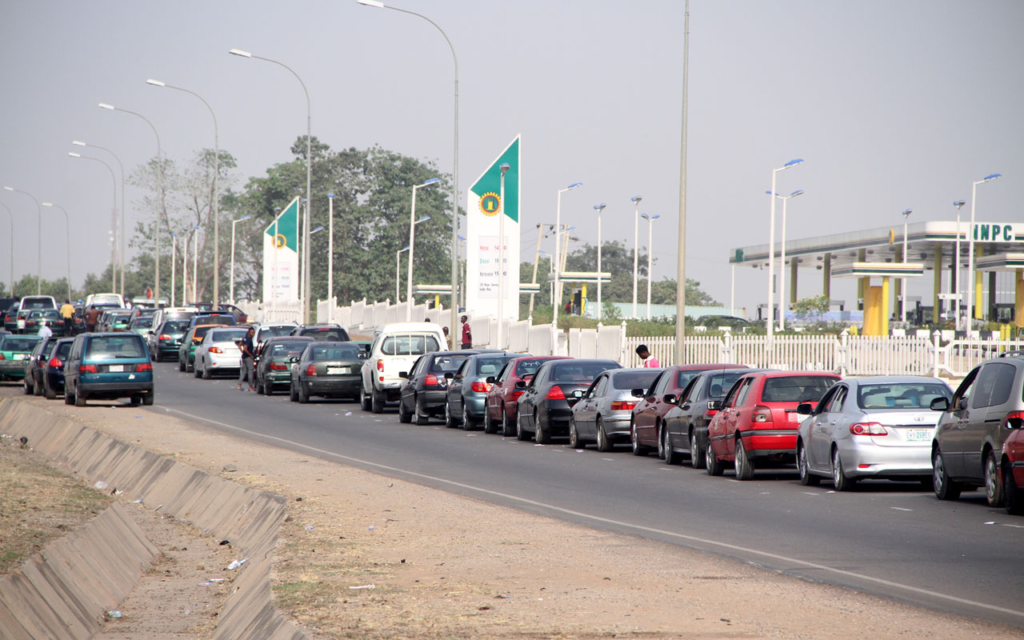Long queues have resurfaced at fuel stations across Nigeria following the Nigerian National Petroleum Corporation’s (NNPC) recent fuel price hike. The New Daily Prime reports that the NNPC raised its pump price from ₦617 to ₦897 per liter on Tuesday, due to the corporation’s massive $6.8 billion debt to international suppliers. While some NNPC stations implemented the new prices immediately, independent filling stations were selling fuel between ₦930 and ₦950 per liter as of Tuesday.
By Wednesday and Thursday, the prices had skyrocketed, with some independent stations selling fuel for over ₦1,000 per liter. The sudden increase left many commuters stranded, causing widespread transportation disruptions as motorists scrambled to buy fuel. In major cities such as Lagos, Abuja, Kaduna, Ibadan, Warri, Jos, and Port Harcourt, motorists faced hours-long waits at petrol stations, resulting in a sharp rise in transportation fares.
Additionally, businesses caught off guard by the sudden price surge have raised the prices of their goods and services. This is not the first fuel price hike under President Bola Tinubu’s administration. Since Tinubu announced the removal of fuel subsidies, fuel prices have fluctuated significantly, sparking widespread public outcry.
Since President Bola Tinubu’s administration began in May 2023, the Nigerian National Petroleum Corporation (NNPC) has increased fuel prices three times. Immediately after the swearing-in, the price rose from N195 to N557, later from N557 to N617 in 2023, and most recently from N617 to N897 per liter on Tuesday. The impact of this pump price increase will be widely felt across all sectors. This follows previous increases from the original price set during the subsidy removal early in Tinubu’s tenure, which led to significant hikes in transportation costs and overall economic hardship for many Nigerians.
Meanwhile, several unions and organizations have condemned the latest increase and called for an immediate reversal. The Nigeria Labour Congress (NLC), Trade Union Congress (TUC), and the main opposition party, the People’s Democratic Party (PDP), have all voiced opposition. The NLC, in a statement signed by its President, Joe Ajaero, criticized the price hike for deepening the suffering of Nigerians and accused the Federal Government of betraying the labor movement.
The statement partly read: “We demand the immediate reversal of the latest increase in the pump price of PMS across the country and the release of all those incarcerated or being prosecuted on the assumption of having participated in the recent protests. Halt the indiscriminate arrest and detention of citizens on trumped-up charges, reverse the 250% tariff hike in electricity, and stop the hijack of the duties of the Ministry of Labour and Employment. End policies that engender hunger and insecurity, halt the government’s culture of terror, fear, and lying. We are guided by our belief in our country and the need to secure and sustain its sovereignty, integrity, and welfare of the people.”
Additionally, the NLC President criticized President Tinubu’s administration for failing to implement the new national minimum wage of N70,000, accusing the government of insincerity and describing its policies as traumatic for Nigerians. According to Ajaero, Mr. Tinubu once proposed to labor leaders a choice between a minimum wage of ₦250,000 and a petrol price of ₦1,500 per liter. He stated that the offer was rejected due to its potentially devastating impact on the Nigerian people.
Furthermore, the PDP, in a statement signed by its National Publicity Secretary, Debo Ologunagba, condemned the recent fuel price hike, calling it an attack on Nigerians. The statement described the increase as a “brutal assault on the sensibility and well-being of Nigerians by the insensitive and arrogant All Progressives Congress (APC) administration.”
The TUC also expressed concern that the sudden increases in fuel and electricity costs would further deepen poverty and intensify the hardships experienced across the country, potentially leading to social unrest. According to their statement, “The TUC received the news of the PMS price hike with great contestation and grave concern. The burden of the PMS price increase is substantial and affects all facets of our socio-economic life. This sudden hike, implemented without consultation with critical stakeholders, represents a blatant disregard for the welfare of the Nigerian people, particularly the working class who bear the brunt of such decisions.”
Pan-Yoruba socio-cultural and political organization Afenifere, along with some civil society organizations, also condemned the recent fuel hike, underscoring the widespread discontent with this policy change.

